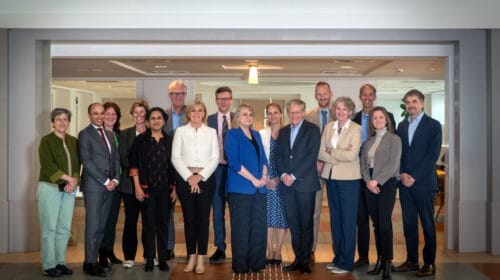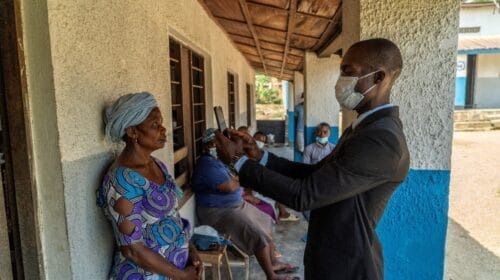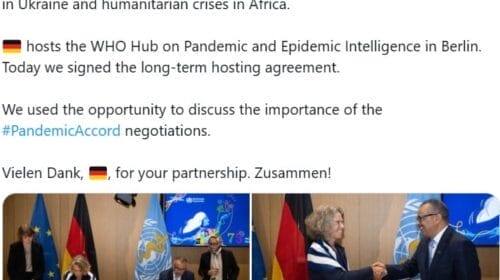Tuesday’s Daily Brief: Eye health, UN’s financial crisis, progress in Mali and South Sudan, human rights in Australia
One billion people have preventable eye conditions, increasingly linked to lifestyle choices: UN health agency
A staggering 2.2 billion people already suffer from eye conditions and visual impairment today, but the global need for eye care is set to increase “dramatically”, with lack of exercise a key factor, the UN health agency said on Tuesday, unveiling its first ever report on vision across the world.
While welcoming recent successes in eliminating common conditions such as trachoma in eight countries, the World Health Organization (WHO) highlighted evidence indicating that eye problems are increasingly linked to lifestyle choices, including screen time.
Youngsters are among those at risk, WHO’s Dr Alarcos Cieza told journalists in Geneva.
Full story here.
Work and reforms of the UN ‘at risk’, Guterres warns Member States, amidst ‘record-level’ cash crisis
The United Nations is facing a severe shortage of cash, and unless more Governments pay their annual dues, “our work and our reforms are at risk”, the UN chief António Guterres told Member States on Tuesday.
In a statement issued by his Spokesperson, the Secretary-General said he had written to Member States, “about the worst cash crisis facing the United Nations in nearly a decade. The Organization runs the risk of depleting its liquidity reserves by the end of the month and defaulting on payments to staff and vendors.”
Here’s our full coverage.
Some progress made towards security in Mali, but still a long way to go, Security Council hears
Some progress has been made towards restoring peace and stability in Mali as outlined in a fragile 2015 peace deal, yet sustainable peace developments are not happening fast enough, the Security Council heard on Tuesday.
Briefing on the Secretary-General’s latest report via videoconference from the capital Bamako, Mahamat Saleh Annadif, Special Representative and head of the UN Mission to the country (MINUSMA), said that while accounts of violence continue to surge, some efforts to accelerate disarmament, demobilization, and reintegration (DDR), as set out in the 2015 Agreement on Peace and Reconciliation in Mali, have proved fruitful.
Full story here.
UN Security Council urges progress towards stability in South Sudan
Marking the one‑year anniversary of the signing of South Sudan’s latest peace agreement, the Security Council reaffirmed on Tuesday the importance of that pact for sustained peace and stability in the country, reiterating its call for its full implementation.
On a statement issued on Tuesday, Council President for the month, Jerry Matthews of South Africa, said the 15-member body welcomed “initial progress” in implementing the agreement signed by President Salva Kiir and his rival, Riek Machar, which includes the formation of required institutions and mechanisms, and an improved environment for the needed delivery of humanitarian assistance to many areas.
The Council highlighted the importance of “expediting the implementation of transitional security arrangements and to continue consultations towards a common solution regarding the number and boundaries of states”.
Council members called on parties not signatory to the agreeement to “renounce violence and adhere to cessation‑of‑hostilities agreements and seek a political resolution to their concerns over the accord”. The Council also called upon the signatories to “engage with non‑signatories in a non‑violent and constructive manner”.
Condemning the ongoing conflict in the Equatoria region, continued sexual violence and all violations of agreements on the protection of civilians, the Council expressed concern over the “dire humanitarian, human rights and economic situation in South Sudan”, and called for protection of medical facilities, personnel and other civilian infrastructure.
It’s time for Australia to roll back restrictive asylum and migration policies, urges Michelle Bachelet
UN human rights chief Michelle Bachelet appealed to the Australian authorities on Tuesday to “roll back” its “entrenched” policies towards migrants and refugees held offshore.
In a wide-ranging speech in Sydney, Ms. Bachelet said that mandatory detention was a “mainstay” of the country’s migration and asylum system.
“The people it affects have largely committed no crime,” she told the Australian Human Rights Commission conference, adding that some of those detained in offshore centres such on Nauru and Manus Island were children who had been subjected to “prolonged, indefinite and effectively unreviewable confinement”.
At the same time, the UN High Commissioner for Human Rights urged Australian authorities to do more to create a “free and equal society”, particularly for women.
The country had a “significantly better track record” in gender equality than many other countries, she noted, before insisting that women “still face many barriers, including unequal pay, workplace discrimination and pervasive sexual harassment”.
What does it mean to be stateless?
It’s a question that’s being discussed all this week in Geneva, at an event organized by the UN refugee agency (UNHCR) to help millions of people without official papers, often through no fault of their own.
After her story was highlighted by UNCHR Goodwill Ambassador Cate Blanchett during Monday’s session, UN News’s Daniel Johnson caught up with Maha Mamo, who grew up in Lebanon before being given Brazilian nationality.
Here you can listen to or download the interview with Maha Mamo, who didn’t “exist” for three decades. She started by describing the everyday problems she encountered, living in limbo.
Listen to or download our audio News in Brief for 8 October on Soundcloud:









